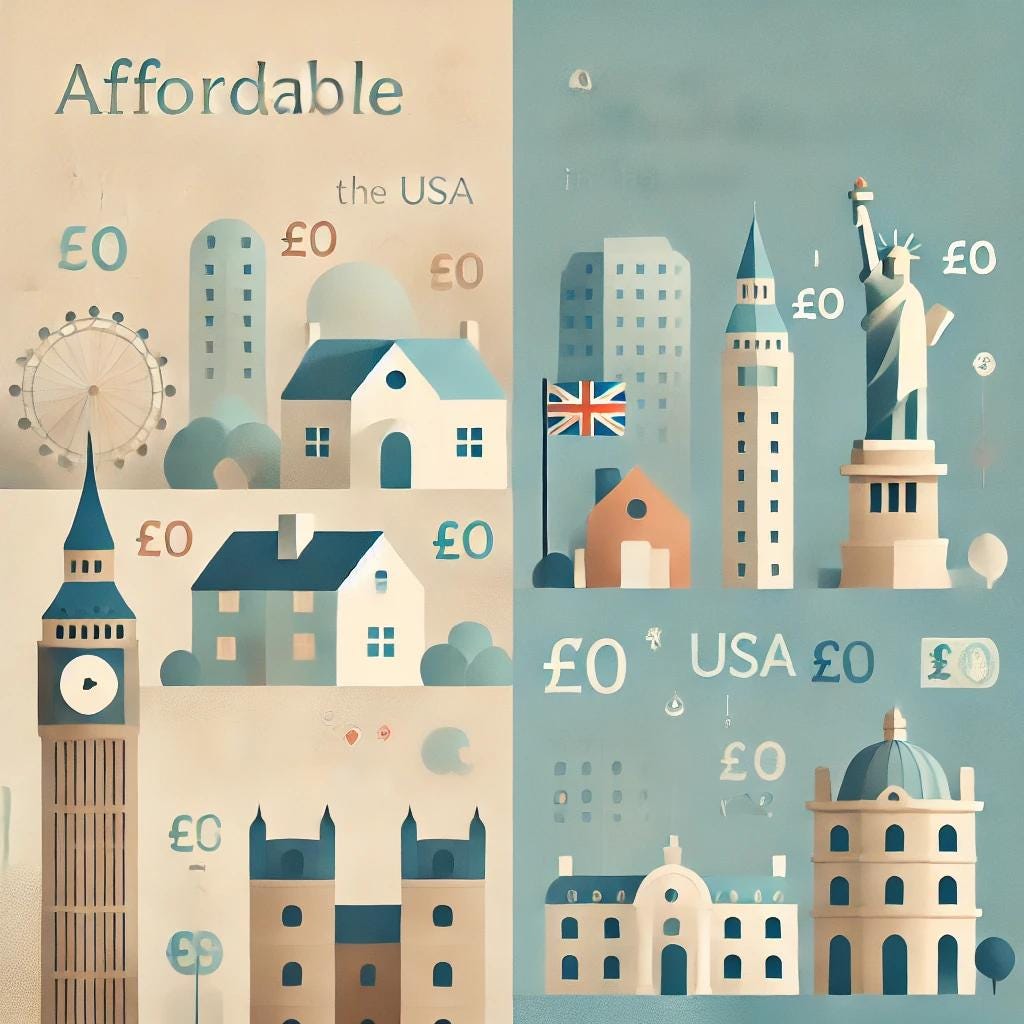Embracing Singlehood: Navigating Challenges and Celebrating Independence in a Couple-Centric World
About India's Broken Marriage Promise law, how to embrace singlehood, affordable cities and one bed room flats, challenging Singlism and more
Welcome to the latest Singles99 Newsletter. In this edition, we are exploring the latest insights on single life, covering India's new law on broken marriage promises designed to protect women, strategies for embracing singlehood, and a look at affordable cities for singles in the UK and USA. We also delve into the debate over single-bed flats in Cambridge and the societal challenges of singlism, as highlighted by Bella DePaulo's advocacy for single life equality.
Write your feedback and suggestions on what we can include in our future newsletters, write to us on singlesworld99@gmail.com. Support us by subscribingor becoming a founding member. Let’s dive in.
India Introduces New Law to Address Broken Marriage Promises. Reason, Protecting Women.
India has introduced a new law targeting men who break off promises of marriage after engaging in sexual relations under false pretenses, which can result in up to 10 years in prison. This legislation, part of a new criminal code replacing the colonial-era penal code, aims to address a form of sexual misconduct that has been prevalent but often ignored. Section 69 of the new law criminalizes engaging in sexual acts by falsely promising marriage or using deceitful tactics like promising career advancement or using a false identity. This move is seen as a way to protect women from exploitation and validate their experiences, as cases of 'promise to marry' rape have been underreported.
Audrey Dmello from Majlis Law supports the law, noting its potential to empower women. However, the law has sparked debate about its implications, with concerns that it might criminalize consensual break-ups. Critics argue that the focus should remain on consent, as consensual sexual encounters should not be penalized. The law also highlights the ongoing influence of traditional values in India, where premarital sex is often taboo. Some younger Indians question the law's relevance in a society that is progressively modernizing, especially in urban areas where traditional views on marriage and relationships are evolving. Despite concerns about potential misuse against men, proponents believe the law shifts societal dynamics by providing women with more equal standing.
Marriage is already a complex endeavor, and for men, it presents even greater challenges. Countries like Japan and South Korea are grappling with declining birth rates and significant demographic shifts. Amid these changes, the world wants people to imagine that women lack agency in matters of consensual sex, portraying women as perpetual victims, overlooking the complexities of gender dynamics and recognizing agency and accountability for all individuals involved in relationships.
Affordable Cities for Singles in the UK and USA
Recent studies have highlighted the most affordable cities for single people in both the UK and the USA, providing valuable insights into cost-effective living options.
In the UK, a study by CIA Landlords identified Derby as the most affordable city for singles, with an average monthly rent of £596 and a disposable income of £530 after expenses. Following Derby, Kingston upon Hull and Stoke-on-Trent also rank highly, offering average rents of £412 and £489, respectively. These cities offer a balance of low living costs and decent amenities, making them attractive options for single renters. Conversely, London is the least affordable city, with an average rent of £1,740 and a negative disposable income of -£1,536, highlighting the financial strain of living in the capital.
In the USA, a study by GOBankingRates found Montgomery, Alabama, to be the most affordable city for singles, with average monthly expenses of $1,807 and a median household income of $77,335. Other affordable cities include Susanville, California, and Palatka, Florida, with low living costs relative to income. In contrast, New York City is the least affordable, with a median rent of $3,308, forcing singles to allocate over 71% of their income to housing.
These findings emphasize the importance of considering both income and living costs when choosing a place to live, especially for those navigating single life. They encourage singles to explore lesser-known cities that offer affordability and a good quality of life.
Are Single-Bed Flats in Cambridge a Reflection of Society's Stigma Against Singles?
Councillor Naomi Bennett has raised concerns about the potential appeal of new single-bed flats planned for construction in Cambridge, questioning whether people would want to rent these flats and "admit that their social and sexual life is completely without prospect." The proposal, submitted by Avon Ground Rents Ltd, involves building four new flats on top of an existing block at Edeva Court, Wulfston Way. The plan includes one two-bedroom flat and three one-bedroom flats, with two of the one-bedroom units only having space for a single bed. Despite meeting minimum space standards, there is skepticism about the demand for such small living spaces. Previously, Cambridge City Council had refused permission for a similar extension due to concerns about inadequate amenity space, but this decision was overturned on appeal. The developer argues that the smaller flats align with local market demands for more one-bedroom units. Councillor Bennett expressed concerns that these properties might not be attractive to renters, as the demand is typically for double bedrooms, even in single-person rental properties.
Rethinking Singlehood: Embracing Independence and Challenging Societal Norms
It is important to understand single people beyond the traditional narrative that equates happiness with romantic relationships. It challenges the notion that being single is a waiting period for finding a soulmate, arguing that single individuals can lead fulfilling, meaningful lives independently. An article in Grotto Network rethinks singlehood for the following reasons.
Rejecting the Soulmate Myth: The idea that a partner completes you is misleading; fulfillment comes from within, and singles should focus on their passions and interests rather than solely on dating.
Addressing Loneliness: While social connections are essential, a relationship is not a cure for loneliness. Encouraging singles to engage in community activities can help them build a supportive network.
Avoiding Idealization of Marriage: The article stresses that marriage should not be idealized, and singles should be reminded that they are valued and loved as they are, without needing to be in a relationship.
Living Fully as a Single: The author reflects on their own experience of missing out on the joys of singlehood by fixating on finding a partner. Instead, they encourage singles to embrace their current lives and pursue personal growth.
Overall, the article advocates for a shift in perspective, encouraging society to celebrate singlehood and recognize the richness of life that can be experienced outside of romantic relationships.
Embracing singlehood has its challenges, here are some ways to make it better.
1. Focus on Self-Reflection
Take time to reflect on your values, goals, and what truly makes you happy. Ask yourself deep questions such as:
What are my core values?
What do I want and need in a future relationship?
How do I define success for myself?
Engaging in journaling or mindfulness practices can help clarify your thoughts and feelings, allowing you to understand yourself better.
2. Set Personal Goals
Use this time to set both short-term and long-term goals. Think about what you want to achieve in various aspects of your life, including career, health, and personal interests.
Break these goals down into actionable steps to keep yourself motivated and on track.
3. Explore New Experiences
Embrace opportunities to step outside your comfort zone. Consider traveling to new places, trying new hobbies, or meeting new people.
Engaging in activities that challenge you can lead to personal growth and self-discovery.
4. Build a Support System
Cultivating meaningful friendships is essential. Surround yourself with positive and supportive individuals who encourage your growth.
Participate in social activities or groups that align with your interests to expand your social circle.
5. Enjoy Your Own Company
Learn to appreciate solitude. Spend time doing things you love, whether it’s reading, hiking, or exploring new interests.
Focus on self-care and prioritize your mental and physical well-being.
6. Practice Gratitude
Cultivating an attitude of gratitude can shift your perspective on being single. Focus on the positive aspects of your life and the opportunities that come with being single.
Regularly acknowledge what you are thankful for to foster a positive mindset.
7. Avoid Comparisons
In a world dominated by social media, it’s easy to compare your life to others. Remember that everyone’s journey is unique, and being single does not diminish your worth.
Focus on your path and celebrate your achievements, no matter how small.
8. Stay Open-Minded
While it's important to focus on self-discovery, remain open to new experiences and potential relationships. Don’t rush into anything; love will come when it's meant to.
Keep an open heart and mind as you navigate your journey.
With these strategies, embrace your singlehood for self-discovery and personal growth, allowing you to emerge more confident and self-aware.
Challenging Singlism: Bella DePaulo's Advocacy for Single Life Equality
In "Single at Heart: The Power, Freedom, and Heart-Filling Joy of Single Life," Bella DePaulo explores the challenges and joys of singlehood. Since its publication, DePaulo has faced numerous questions about fairness to single people, particularly from sociologist Kris Marsh. Marsh inquired about changes DePaulo would make to improve how singles are treated, highlighting issues like the limitations of the Family and Medical Leave Act, which doesn't allow singles to take leave for non-spousal significant others. DePaulo argues that marital status should not determine access to benefits and protections, noting systemic inequalities that disadvantage singles, such as Social Security policies that favor married individuals. She emphasizes the pervasive "singlism" in everyday life, where singles face stereotypes and marginalization. Despite societal biases, DePaulo notes that singles who thrive do so impressively, as they navigate systems that often privilege married individuals. Her work calls for recognition of the unique challenges singles face and advocates for systemic changes to ensure fairness and equality.
Singles99 is the global community for single people - where singles come to shine
In a world predominantly focused on couples and family-building, Singles99 emerges as a pioneering community dedicated to the often-overlooked 2.1 billion single individuals globally. We recognize that singlehood is not merely a transitional phase but a significant lifestyle choice or circumstance for a substantial portion of the world's population.
Singles99 acknowledges the diverse reasons behind singlehood, from highly educated individuals who delayed coupling to pursue career goals, to those actively seeking partnerships but facing challenges, and the growing number of "conscious singles" who deliberately choose this lifestyle.
Join our communities:









